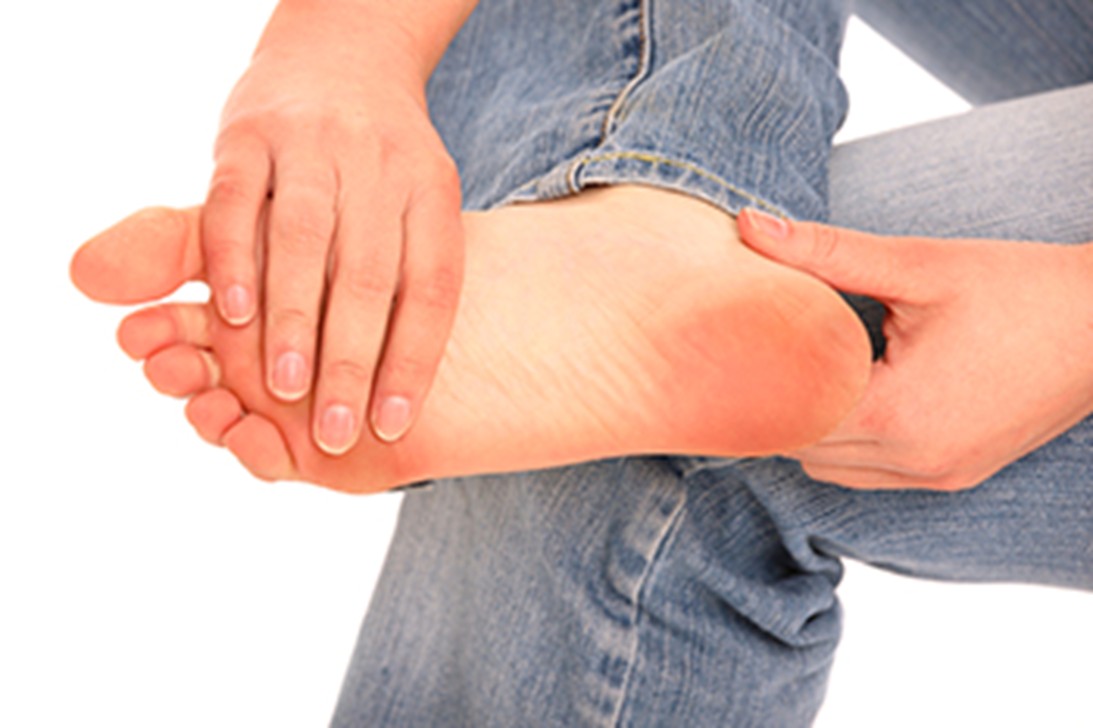Connect With Us
Blog
Blog
The Hidden Impact of Foot Pain on Walking Biomechanics

Walking is a complex movement that relies on proper alignment and coordination of the feet, ankles, and legs. When foot pain develops, it can alter normal biomechanics, causing changes in gait and posture that place stress on other joints. Common causes include plantar fasciitis, arthritis, flat feet, or injury to soft tissues. Symptoms include aching, stiffness, or sharp pain that worsens with activity. Over time, these changes can lead to limping, uneven wear on shoes, or discomfort in the knees, hips, and lower back. The foot may appear swollen or misaligned, and walking may feel awkward or unstable. A podiatrist can assess gait and foot structure through examination, imaging, and biomechanical analysis. Treatment may include custom orthotics, footwear recommendations, and stretching programs to relieve pain and restore natural movement. If foot pain is affecting how you walk, it is suggested that you make an appointment with a podiatrist to prevent further complications and maintain healthy mobility.
If you have any concerns about your feet, contact one of our clinicians from The Footcare Centre. Our podiatrists can provide the care you need to keep you pain-free and on your feet.
Biomechanics in Podiatry
Podiatric biomechanics is a particular sector of specialty podiatry with licensed practitioners who are trained to diagnose and treat conditions affecting the foot, ankle and lower leg. Biomechanics deals with the forces that act against the body, causing an interference with the biological structures. It focuses on the movement of the ankle, the foot and the forces that interact with them.
A History of Biomechanics
- Biomechanics dates back to the BC era in Egypt where evidence of professional foot care has been recorded.
- In 1974, biomechanics gained a higher profile from the studies of Merton Root, who claimed that by changing or controlling the forces between the ankle and the foot, corrections or conditions could be implemented to gain strength and coordination in the area.
Modern technological improvements are based on past theories and therapeutic processes that provide a better understanding of podiatric concepts for biomechanics. Computers can provide accurate information about the forces and patterns of the feet and lower legs.
Understanding biomechanics of the feet can help improve and eliminate pain, stopping further stress to the foot.
If you have any questions please feel free to contact our office located in Weybridge, UK . We offer the newest diagnostic and treatment technologies for all your foot and ankle needs.
The Athletic Foot Powers Every Move and Jump

Every sport begins at ground level, with your feet. They support your body, absorb impact, and power every stride, jump, and pivot. Even small differences in foot structure, such as toe length or arch height, can influence how you move, balance, and perform. A longer big toe, for example, helps athletes push off with greater force in sprinting or skiing, while strong arches provide stability during side-to-side motions in tennis or basketball. Yet, the same mechanics that make feet powerful also make them vulnerable. Overuse, poor footwear, or uneven surfaces can lead to sprains, stress fractures, Achilles tendon injuries, or plantar fasciitis. Maintaining strength and flexibility in the feet and ankles helps prevent these issues. If you experience persistent pain or swelling in your feet or ankles from sports activity, it is suggested that you visit a podiatrist for evaluation and treatment.
Sports related foot and ankle injuries require proper treatment before players can go back to their regular routines. For more information, contact one of our clinicians of The Footcare Centre. Our podiatrists can provide the care you need to keep you pain-free and on your feet.
Sports Related Foot and Ankle Injuries
Foot and ankle injuries are a common occurrence when it comes to athletes of any sport. While many athletes dismiss the initial aches and pains, the truth is that ignoring potential foot and ankle injuries can lead to serious problems. As athletes continue to place pressure and strain the area further, a mild injury can turn into something as serious as a rupture and may lead to a permanent disability. There are many factors that contribute to sports related foot and ankle injuries, which include failure to warm up properly, not providing support or wearing bad footwear. Common injuries and conditions athletes face, including:
- Plantar Fasciitis
- Achilles Tendinitis
- Achilles Tendon Rupture
- Ankle Sprains
Sports related injuries are commonly treated using the RICE method. This includes rest, applying ice to the injured area, compression and elevating the ankle. More serious sprains and injuries may require surgery, which could include arthroscopic and reconstructive surgery. Rehabilitation and therapy may also be required in order to get any recovering athlete to become fully functional again. Any unusual aches and pains an athlete sustains must be evaluated by a licensed, reputable medical professional.
If you have any questions please contact our office located in Weybridge, UK . We offer the newest diagnostic and treatment technologies for all your foot and ankle needs.
Approaches for Healing Complex Diabetic Foot Wounds

Diabetic foot wounds can be stubborn and difficult to heal, often requiring more than standard dressings and rest. Advances in care have introduced therapies that improve circulation, encourage new tissue growth, and reduce infection risk. Hyperbaric oxygen therapy is one option that supplies extra oxygen to the tissues, helping speed up repair. Negative pressure wound therapy uses gentle suction to remove fluids and promote blood flow. Skin substitutes and growth factor treatments can also stimulate healing when traditional methods fall short. Each therapy is chosen based on the severity of the wound and the overall health of the patient. The goal is always to restore mobility, prevent infection, and avoid complications that could lead to surgery. If you are living with a complex diabetic foot wound, it is suggested that you schedule a visit with a podiatrist to discuss the best treatment plan for you.
Wound care is an important part in dealing with diabetes. If you have diabetes and a foot wound or would like more information about wound care for diabetics, consult with one of our clinicians from The Footcare Centre. Our podiatrists will assess your condition and provide you with quality foot and ankle treatment.
What Is Wound Care?
Wound care is the practice of taking proper care of a wound. This can range from the smallest to the largest of wounds. While everyone can benefit from proper wound care, it is much more important for diabetics. Diabetics often suffer from poor blood circulation which causes wounds to heal much slower than they would in a non-diabetic.
What Is the Importance of Wound Care?
While it may not seem apparent with small ulcers on the foot, for diabetics, any size ulcer can become infected. Diabetics often also suffer from neuropathy, or nerve loss. This means they might not even feel when they have an ulcer on their foot. If the wound becomes severely infected, amputation may be necessary. Therefore, it is of the upmost importance to properly care for any and all foot wounds.
How to Care for Wounds
The best way to care for foot wounds is to prevent them. For diabetics, this means daily inspections of the feet for any signs of abnormalities or ulcers. It is also recommended to see a podiatrist several times a year for a foot inspection. If you do have an ulcer, run the wound under water to clear dirt from the wound; then apply antibiotic ointment to the wound and cover with a bandage. Bandages should be changed daily and keeping pressure off the wound is smart. It is advised to see a podiatrist, who can keep an eye on it.
If you have any questions please contact our office located in Weybridge, UK . We offer the newest diagnostic and treatment technologies for all your foot and ankle needs.
What Bottom of Foot Pain Could Be Telling You
 Pain on the bottom of the foot can be caused by plantar fasciitis, metatarsalgia, or peripheral neuropathy. Plantar fasciitis involves inflammation of the band of tissue along the arch, causing sharp heel pain, especially in the morning. Metatarsalgia affects the ball of the foot and may feel like a burning or aching sensation worsened by standing or walking. Peripheral neuropathy, often linked to diabetes or nerve damage, can cause tingling, numbness, or shooting pain in the soles of the feet. Each condition appears differently, but all can significantly impact mobility and quality of life. A podiatrist can perform a thorough evaluation, including a physical exam, gait analysis, and imaging if needed, to determine the cause. Treatment may involve custom orthotics, stretching exercises, footwear changes, medications, or specialized therapies. Addressing foot pain early can prevent long-term discomfort and complications. To find lasting relief, it is suggested that you make an appointment with a podiatrist.
Pain on the bottom of the foot can be caused by plantar fasciitis, metatarsalgia, or peripheral neuropathy. Plantar fasciitis involves inflammation of the band of tissue along the arch, causing sharp heel pain, especially in the morning. Metatarsalgia affects the ball of the foot and may feel like a burning or aching sensation worsened by standing or walking. Peripheral neuropathy, often linked to diabetes or nerve damage, can cause tingling, numbness, or shooting pain in the soles of the feet. Each condition appears differently, but all can significantly impact mobility and quality of life. A podiatrist can perform a thorough evaluation, including a physical exam, gait analysis, and imaging if needed, to determine the cause. Treatment may involve custom orthotics, stretching exercises, footwear changes, medications, or specialized therapies. Addressing foot pain early can prevent long-term discomfort and complications. To find lasting relief, it is suggested that you make an appointment with a podiatrist.
Foot Pain
Foot pain can be extremely painful and debilitating. If you have foot pain, consult with one of our clinicians from The Footcare Centre. Our podiatrists will assess your condition and provide you with quality foot and ankle treatment.
Causes
Foot pain is a very broad condition that could be caused by one or more ailments. The most common include:
- Bunions
- Hammertoes
- Plantar Fasciitis
- Bone Spurs
- Corns
- Tarsal Tunnel Syndrome
- Ingrown Toenails
- Arthritis (such as Gout, Rheumatoid, and Osteoarthritis)
- Flat Feet
- Injury (from stress fractures, broken toe, foot, ankle, Achilles tendon ruptures, and sprains)
- And more
Diagnosis
To figure out the cause of foot pain, podiatrists utilize several different methods. This can range from simple visual inspections and sensation tests to X-rays and MRI scans. Prior medical history, family medical history, and any recent physical traumatic events will all be taken into consideration for a proper diagnosis.
Treatment
Treatment depends upon the cause of the foot pain. Whether it is resting, staying off the foot, or having surgery; podiatrists have a number of treatment options available for foot pain.
If you have any questions, please feel free to contact our offices located in Weybridge, UK. We offer the newest diagnostic and treatment technologies for all your foot and ankle needs.
Blog Archives
- 2025
- 2024
- 2023
- 2022
- 2021
- 2020

